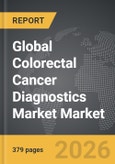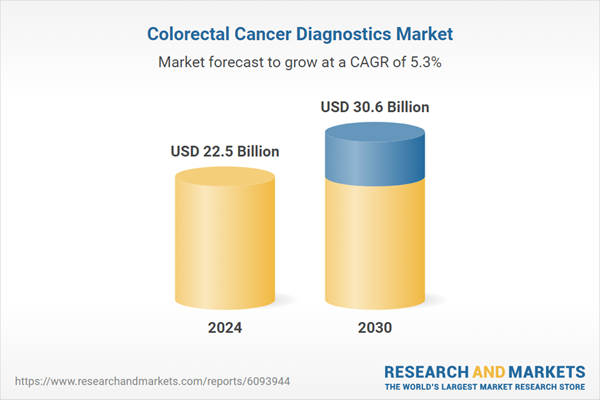Global Colorectal Cancer Diagnostics Market - Key Trends & Drivers Summarized
How Are Technological Advancements Enhancing Colorectal Cancer Detection?
The landscape of colorectal cancer (CRC) diagnostics is undergoing a significant transformation, propelled by technological innovations aimed at improving early detection and patient outcomes. Traditional methods like colonoscopy and fecal occult blood tests (FOBT) have been the cornerstone of CRC screening. However, the emergence of non-invasive techniques such as fecal immunochemical tests (FIT) and stool DNA tests is gaining traction due to their ease of use and patient compliance. These methods offer a less invasive alternative, encouraging more individuals to participate in regular screening programs.Moreover, the integration of artificial intelligence (AI) and machine learning algorithms in diagnostic procedures is enhancing the accuracy and efficiency of CRC detection. AI-powered tools are being developed to analyze imaging data, identify polyps, and assess malignancy risks with greater precision. This technological shift not only streamlines the diagnostic process but also aids in the early identification of cancerous lesions, which is crucial for effective treatment and improved survival rates.
What Role Do Liquid Biopsies Play in the Future of CRC Diagnostics?
Liquid biopsy technology is emerging as a promising frontier in the field of CRC diagnostics. By analyzing circulating tumor DNA (ctDNA) in a patient's blood, liquid biopsies offer a minimally invasive method to detect cancer-related genetic mutations. This approach facilitates early diagnosis, monitors treatment responses, and detects potential recurrences with high sensitivity. The adoption of liquid biopsies is particularly beneficial for patients who are unable or unwilling to undergo traditional invasive procedures.The development of blood-based tests like Guardant Health's Shield and Exact Sciences' upcoming offerings exemplify the potential of liquid biopsies in revolutionizing CRC screening. These tests aim to complement existing screening methods, providing an additional tool for early detection and personalized treatment strategies. As research progresses and validation studies confirm their efficacy, liquid biopsies are poised to become an integral component of comprehensive CRC diagnostic protocols.
How Are Market Dynamics and Healthcare Policies Influencing CRC Diagnostic Adoption?
The global CRC diagnostics market is experiencing growth, influenced by factors such as rising incidence rates, aging populations, and increased awareness of the importance of early detection. Healthcare policies and reimbursement frameworks play a pivotal role in shaping the adoption of diagnostic technologies. For instance, the inclusion of certain tests in national screening programs and insurance coverage can significantly boost their utilization.In regions like North America and Europe, government initiatives promoting regular CRC screening have led to higher participation rates and early-stage diagnoses. Conversely, in developing countries, limited access to healthcare services and lack of awareness pose challenges to widespread adoption. Efforts to address these disparities include public health campaigns, mobile screening units, and partnerships with non-governmental organizations to expand reach and accessibility.
The Growth in the Colorectal Cancer Diagnostics Market Is Driven by Several Factors…
The growth in the colorectal cancer diagnostics market is driven by several factors closely tied to technological advancements, healthcare infrastructure development, and shifting demographic trends. The increasing prevalence of CRC, particularly among aging populations, underscores the need for effective screening and diagnostic solutions. Innovations in non-invasive testing methods, such as FIT, stool DNA tests, and liquid biopsies, are enhancing patient compliance and enabling earlier detection of malignancies.Additionally, the integration of AI and machine learning in diagnostic procedures is improving accuracy and efficiency, facilitating timely interventions. Healthcare policies that support regular screening and provide reimbursement for advanced diagnostic tests are further propelling market expansion. Efforts to raise awareness about CRC and the importance of early detection, coupled with initiatives to improve access to screening services in underserved regions, are also contributing to the market's growth trajectory. Collectively, these factors are shaping a dynamic and evolving landscape for colorectal cancer diagnostics, with a focus on improving patient outcomes and reducing the global burden of the disease.
Report Scope
The report analyzes the Colorectal Cancer Diagnostics market, presented in terms of market value (US$). The analysis covers the key segments and geographic regions outlined below:- Segments: Cancer Type (Adenocarcinoma, Colorectal Lymphoma, Gastrointestinal Stromal Tumors, Carcinoid Tumors, Other Cancer Types); Product Type (Instruments, Consumables & Accessories); End-Use (Hospitals, Diagnostic Centers, Cancer Research Centers, Ambulatory Surgery Centers, Other End-Uses).
- Geographic Regions/Countries: World; United States; Canada; Japan; China; Europe (France; Germany; Italy; United Kingdom; Spain; Russia; and Rest of Europe); Asia-Pacific (Australia; India; South Korea; and Rest of Asia-Pacific); Latin America (Argentina; Brazil; Mexico; and Rest of Latin America); Middle East (Iran; Israel; Saudi Arabia; United Arab Emirates; and Rest of Middle East); and Africa.
Key Insights:
- Market Growth: Understand the significant growth trajectory of the Adenocarcinoma segment, which is expected to reach US$13.7 Billion by 2030 with a CAGR of a 6.7%. The Colorectal Lymphoma segment is also set to grow at 3.5% CAGR over the analysis period.
- Regional Analysis: Gain insights into the U.S. market, valued at $6.1 Billion in 2024, and China, forecasted to grow at an impressive 8.6% CAGR to reach $6.2 Billion by 2030. Discover growth trends in other key regions, including Japan, Canada, Germany, and the Asia-Pacific.
Why You Should Buy This Report:
- Detailed Market Analysis: Access a thorough analysis of the Global Colorectal Cancer Diagnostics Market, covering all major geographic regions and market segments.
- Competitive Insights: Get an overview of the competitive landscape, including the market presence of major players across different geographies.
- Future Trends and Drivers: Understand the key trends and drivers shaping the future of the Global Colorectal Cancer Diagnostics Market.
- Actionable Insights: Benefit from actionable insights that can help you identify new revenue opportunities and make strategic business decisions.
Key Questions Answered:
- How is the Global Colorectal Cancer Diagnostics Market expected to evolve by 2030?
- What are the main drivers and restraints affecting the market?
- Which market segments will grow the most over the forecast period?
- How will market shares for different regions and segments change by 2030?
- Who are the leading players in the market, and what are their prospects?
Report Features:
- Comprehensive Market Data: Independent analysis of annual sales and market forecasts in US$ Million from 2024 to 2030.
- In-Depth Regional Analysis: Detailed insights into key markets, including the U.S., China, Japan, Canada, Europe, Asia-Pacific, Latin America, Middle East, and Africa.
- Company Profiles: Coverage of players such as Accusize Industrial Tools, Albrecht GmbH, Centaur Precision Tools, EWS Weigele GmbH & Co. KG, EMUGE-FRANKEN and more.
- Complimentary Updates: Receive free report updates for one year to keep you informed of the latest market developments.
Some of the 37 companies featured in this Colorectal Cancer Diagnostics market report include:
- Abbott Laboratories
- Amgen Inc.
- Becton, Dickinson and Company
- Bruker Corporation
- Clinical Genomics Technologies Pty Ltd
- Danaher Corporation
- EDP Biotech Corporation
- Eiken Chemical Co., Ltd.
- Epigenomics AG
- Exact Sciences Corporation
- F. Hoffmann-La Roche AG
- Fujirebio
- GE Healthcare
- Geneoscopy Inc.
- Guardant Health, Inc.
- Hologic, Inc.
- Illumina, Inc.
- Medtronic plc
- Novigenix SA
- Quest Diagnostics Incorporated
This edition integrates the latest global trade and economic shifts into comprehensive market analysis. Key updates include:
- Tariff and Trade Impact: Insights into global tariff negotiations across 180+ countries, with analysis of supply chain turbulence, sourcing disruptions, and geographic realignment. Special focus on 2025 as a pivotal year for trade tensions, including updated perspectives on the Trump-era tariffs.
- Adjusted Forecasts and Analytics: Revised global and regional market forecasts through 2030, incorporating tariff effects, economic uncertainty, and structural changes in globalization. Includes historical analysis from 2015 to 2023.
- Strategic Market Dynamics: Evaluation of revised market prospects, regional outlooks, and key economic indicators such as population and urbanization trends.
- Innovation & Technology Trends: Latest developments in product and process innovation, emerging technologies, and key industry drivers shaping the competitive landscape.
- Competitive Intelligence: Updated global market share estimates for 2025, competitive positioning of major players (Strong/Active/Niche/Trivial), and refined focus on leading global brands and core players.
- Expert Insight & Commentary: Strategic analysis from economists, trade experts, and domain specialists to contextualize market shifts and identify emerging opportunities.
Table of Contents
Companies Mentioned (Partial List)
A selection of companies mentioned in this report includes, but is not limited to:
- Abbott Laboratories
- Amgen Inc.
- Becton, Dickinson and Company
- Bruker Corporation
- Clinical Genomics Technologies Pty Ltd
- Danaher Corporation
- EDP Biotech Corporation
- Eiken Chemical Co., Ltd.
- Epigenomics AG
- Exact Sciences Corporation
- F. Hoffmann-La Roche AG
- Fujirebio
- GE Healthcare
- Geneoscopy Inc.
- Guardant Health, Inc.
- Hologic, Inc.
- Illumina, Inc.
- Medtronic plc
- Novigenix SA
- Quest Diagnostics Incorporated
Table Information
| Report Attribute | Details |
|---|---|
| No. of Pages | 379 |
| Published | February 2026 |
| Forecast Period | 2024 - 2030 |
| Estimated Market Value ( USD | $ 22.5 Billion |
| Forecasted Market Value ( USD | $ 30.6 Billion |
| Compound Annual Growth Rate | 5.3% |
| Regions Covered | Global |









